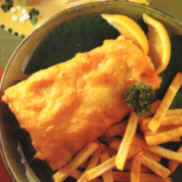The GBK CookbookApplied Ability AwardsThe British Food TrustOther |
Far Flung Fish and Chipsby Marion Watson
Whilst this modern building with its leaded glass windows, chandeliers and fitted carpets is as sumptuous as any restaurant, fish and chips had their origins in working class districts. It was cheap, nutritious and ready for immediate consumption after a hard day’s work. Cooked foods shops had been around for hundreds of years but it was not until the nineteenth century that fish and chips appeared. Even then, at first, it was just fried fish that was sold. A fried fish warehouse is mentioned by Dickens in Oliver Twist. Fish was cooked in shallow pans and usually eaten cold. Next some shops added baked potatoes. Just who had the idea of serving them with chips is open to dispute. Londoners claim that it was Malin’s in the East End, opened in 1868 but northerners say that John Lees set up a wooden hut in Mossley, Manchester, in 1863. Besides selling pigs’ trotters and pea soup he added fish and chips to his menu. Regional favouritesHaddock and hake are the favourites in the north and cod in the south. Beef dripping is used for cooking in the north, oil in the south. Early fish friers were not a popular group. In 1876 Dr Ballard, a health inspector, wrote in his report: ‘It is a petty trade, but nevertheless, it is a source of considerable nuisance in some neighbourhoods, the offensive smell of the oil boiling and the fish frying spreading often through the whole length of the street where the shop is situated.’ Henry Mayhew in his famous London Labour and the London Poor, 1861 said ‘The fried fish sellers live in some out-of-the-way alley, and not infrequently in garrets, for even among the poorest class there are great objections to their being fellow lodgers on account of the odour of the frying.’ Even in the early twentieth century things were not much better. C.H. Benfield of Leicester said in 1907: ‘I do not think there is a worse paid trade in the United Kingdom than ours, considering the hours we work, some of us from 6 in the morning till 11.30 at night.’ Harry gets going
He used stainless steel long before it became commonplace: for special buckets to take the correct measure of chips and for worktops that were easier to clean than the old wooden ones. Batter ingredients were measured with the utmost precision and the scales checked every day. He had non-drip teapots specially designed and bought bottles which dispensed exactly the right amount of vinegar. These had to be checked as part of the list of one hundred daily tasks to be performed before opening. He is said to have been more interested in the cleanliness of the waste bins than in the contents of the tills. Wider still and wider In the Fifties the business became a company. Harry died in 1963 and it was taken over. It changed hands again in 1988 and besides other branches in the UK, including Heathrow Airport, there is now one in Hong Kong. But fish and chips went overseas long before that. Wherever the British went, so did their favourite fast food. Kiosks sprang up outside overseas army and air force bases and settlers took the tradition with them to all parts of the Empire. When the Yorkshire Society of Singapore had a party it imported not only the fish and chip ingredients but copies of the Yorkshire Evening Post to wrap them in. In Toronto food fairs sell halibut and chips whilst in Seattle uncoated halibut or salmon is cooked outdoors over smokey wooden stoves and served with what they call chips but which are really quartered jacket potatoes. Belgium’s answer is mussels and chips, served with mayonnaise whilst in the Mediterranean the fish may well be squid. Food for allFish and chips must be one of the most classless dishes in Britain. Eaten anywhere and everywhere. In Yorkshire a fur-coated lady was seen stopping her chauffeur driven Rolls Royce to go into a take-away. Magnus Pyke cites it as an example of a traditional dish once jeered at by food snobs and even censured by health food devotees but now fully appreciated as a nutritious combination. But not everyone gets it quite right. A friend was invited to a lavish party given by some Singapore Chinese. The party went on all night and when breakfast was served the hosts honoured their English guests with (what they thought was) a traditional British breakfast - fish and chips. References
|
||



 Top of page
Top of page
 Previous page
Previous page